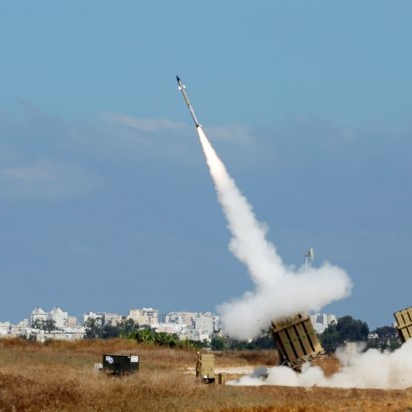click to dowload our latest edition
CLICK HERE TO SUBSCRIBE TO OUR NEWSLETTER


Published
7 years agoon
By
adminPAULA SLIER
So, when the Israel Defence Forces released a statement a few days ago admitting its warplanes had hit several targets in Syria, it was unusual to say the least.
The statement went on to read that during the operation, which was aimed at an arms convoy of the Lebanese militant group, Hezbollah, “several anti-aircraft missiles were launched from Syria. One of the missiles was intercepted by the air defence system of the IDF.”
That missile reportedly had a 200kg warhead and for the first time Israel officially confirmed firing its most advanced Arrow missile defence system to bring it down. The explosion was heard as far away as Jerusalem and fragments landed in Jordan.
It was the most serious incident to date between the two countries since the Syrian civil war erupted six years ago.
Israel’s Defence Minister Avigdor Lieberman, threatened that Israel would destroy Syria’s air defence system if she ever fired an anti-aircraft missile at the Jewish State again.
Syrian President Bashar al-Assad retorted that he was counting on Russia to prevent a conflict with Israel.
Strong words from both sides – a warning that neither intends to back down. But at the same time neither seriously wants war.
Assad has his hands full trying to contain the implosion of his country and Israel is trying to stop the war from creeping across her border.
Over the past six years there has been sporadic cross-border fire and shells have landed in the Israeli part of the Golan Heights from Syria. The IDF has always insisted they were strays and while that might be so, the changes in Syria have brought Israeli Prime Minister Benjamin Netanyahu’s arch nemesis, Iran, closer than ever to Israel’s northern border.
Netanyahu regards Iran and its allies, of which the Assad regime in Syria is one and Hezbollah another, as the most dangerous threat facing Israel. Hezbollah fighters are on the ground in Syria assisting Assad’s army.
While Israel’s official position is that it is not involved in Syria, it is an open secret that the country has relations with Sunni rebels fighting against Assad, near the Israeli-Syrian border.
Israel would much rather they remain the dominant force there instead of soldiers aligned with Assad’s army, Iran or other jihadist groups. The last thing Israel wants is Islamic State fighters on its border.
How then to stop Iran and its allies from using the situation in Syria to improve their position against Israel? This is precisely the quandary the Israelis find themselves in.
One way is to provide medical aid to Syrian civilians and wounded rebel fighters from the border area – Israel does this and is very public about it, although the precise nature of her assistance to the rebels is unknown.
Stopping Iranian arms shipments destined for Hezbollah is another. In the last four months, in addition to last week’s IAF strike in Syria, there have been reports of at least four other similar Israeli raids. Jerusalem worries these weapons will eventually find their way to the group’s Beirut headquarters from where they’ll be pointed in Israel’s direction.
I have spent time on the Lebanese-Syrian border watching huge truckloads of fruit and vegetables passing through the official crossings. Civilians there were afraid to talk on camera but were happy to tell me it was common knowledge that among the produce were hidden weapons.
On another occasion I interviewed Lebanese fighters who patrol the Lebanese-Syria border as a second line of defence to the Lebanese army. They were full of praise for Hezbollah fighters deep inside Syria.
As one of them told me: “We were not fortunate like our fathers to fight against Israel. We are using this opportunity to fight in Syria, to learn, and then when the war stops we will have the experience we need to turn our attention against Israel” – precisely what Jerusalem is afraid of.
At this stage the future of Syria is anyone’s guess. Peace efforts continue to fail and there is a lot of talk that the country could be broken up into fiefdoms, although this is no-one’s preference.
For years when I interviewed Israelis they would consent that although they despised Assad, the idiom “better the devil you know than the devil you don’t”, held true. Should Syria be divided, Israel and the international community would face a number of smaller, economically unviable, states with various leaders ruling over different minorities, prone to extremism, and harbouring revenge.
Right now it doesn’t look like there’ll be a wider confrontation between Israel and Syria. Israel has a military advantage over Syria and it’s doubtful whether Damascus is interested in dragging Israel into a war – one that from its perspective would wipe out all the achievements the regime has chalked up in recent months. But the winds of war are blowing and most Israelis feel the chill.
